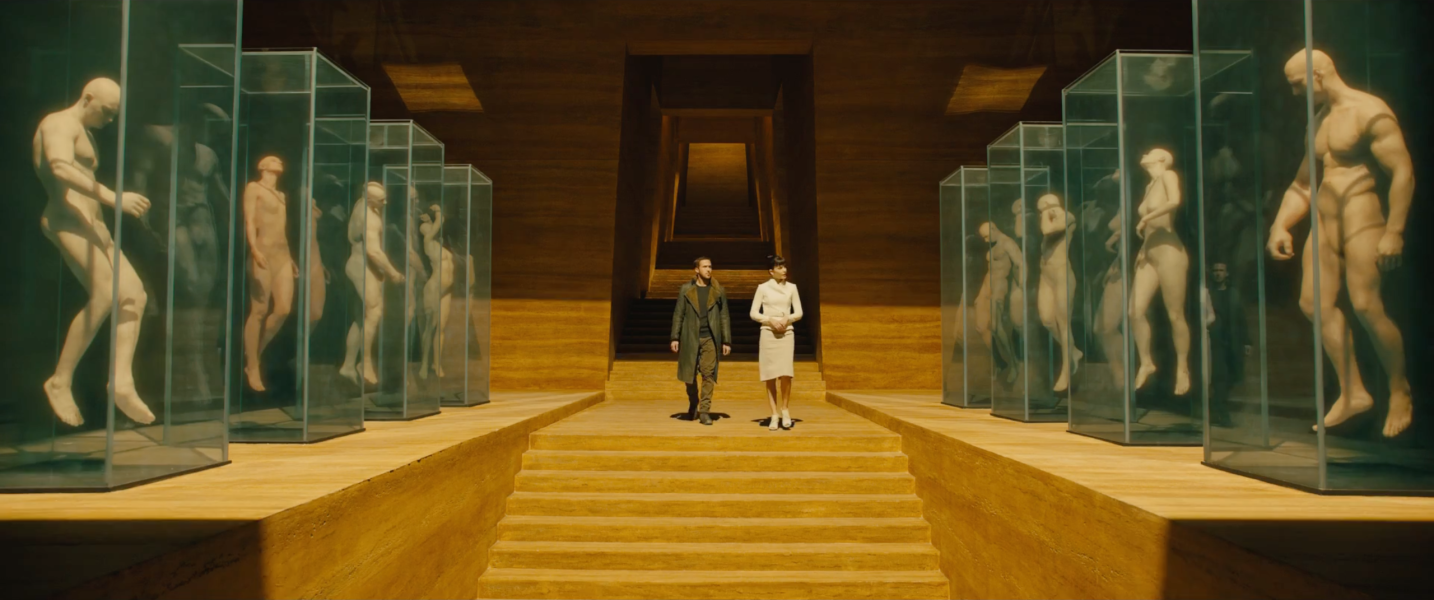“Blade Runner 2049”
Episode 72.5

Reaction time is a factor in this so please pay attention. Answer as quickly as you can.
Are the best parts ‘Blade Runner’ mythos or idiosyncrasy? Fate or chance? Can it be both? And which do you think Denis Villeneuve prefers?
Blade Runner 2049 is a monument to the 1982 original. In fact, it’s full of literal monuments. The headquarters of the former Tyrell Corporation look more than ever like they belong in Giza. The brothel holograms of Los Angeles tower like the Colossus of Rhodes. The film’s opening flight into futurist California protein farmland looks as though it’s skimming the surface of a horizon-sized, metallic gem.
And why wouldn’t Denis Villeneuve (director of Arrival, Sicario and Prisoners) want to make a monument to Blade Runner? It’s a seminal film for so many people, especially in his age group. He’s worked up a visual triumph of a sequel, set 20 years later and starring Ryan Gosling as the heir to Rick Deckard’s coat and retiring pistol. The burgeoning prestige artist sees this world of replicants, humans, and now sentient digital projections of humans as drawn in powerful, arrow-straight lines. Likewise, the questions he asks about the world take a Prometheus-style approach to another of Ridley Scott’s legendary early works. The script ruminates on saviors and believers in an unabashedly biblical way. And while Gosling fashions himself as a sci-fi J.J. Gittes, just as Harrison Ford once did, at two hours and 45 minutes, 2049 tunnels through noir until it finds the daylight of the epic it apparently always wanted to be.
The question is less whether this sequel is good — it’s a technical marvel that has some breath-taking homages to the original’s ambient, hypnotic suspense. No, the question is whether Villeneuve, in all his emotional and mighty directing, has missed the essence of Blade Runner.
The original’s enduring question is based around a qundary that fans, the director and the star have been arguing about for 40 years: Is Deckard himself a replicant? I would also put forward that the enthusiasm for the 1982 movie — its cult — is based on universe-building, its chaotic, but intricately imagined urban grime, and the fact that the movie often seems stitched together by bizarre cuts and sets that seem brought to life by the whims and glitches of the subconscious. Both films thrive on a dream-like quality, but the original’s is fueled by whiskey, alienation and mystery; Villeneuve imagines it more as prophecy.
So fear not. Blade Runner 2049 is honorific and gorgeous. It has at least three unbelievable set pieces. Harrison Ford does his best acting in a decade. I would watch Robin Wright play the police captain whose only props are booze and desks any day. I just get a creeping sense of the epic as mandatory, like Villeneuve had to prove to a high court of Warner executives and Ridley Scott that this world was important enough to revisit. Meanwhile, the next chapter of a detective story seems just as, if not more appropriate. Must all our franchises give over to the thematic melodrama of parentage and gods and sacrifice (and Christopher Nolan) to keep living? The glory of the new film strikes me as a way of pretending the original’s messy, unsettling, ambiguous lifeblood was worthy of being purified. Behold, the new model.
All Episodes
our favorite movies
all movies
Wait, What is This?
Movie Reviews & Reappraisals
Be Reel was a movie reviewing & reappraising podcast hosted by Chance Solem-Pfeifer and Noah Ballard.
We cherished our 8-year run, talking to filmmakers like Gus Van Sant, insulting each other’s taste, and laughing to high heaven.
Chance’s new movie podcast, The Kick, continues to explore curated sub-genres and movie geekery. Noah is a frequent and beloved guest.